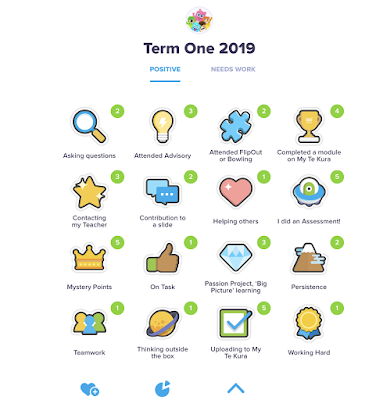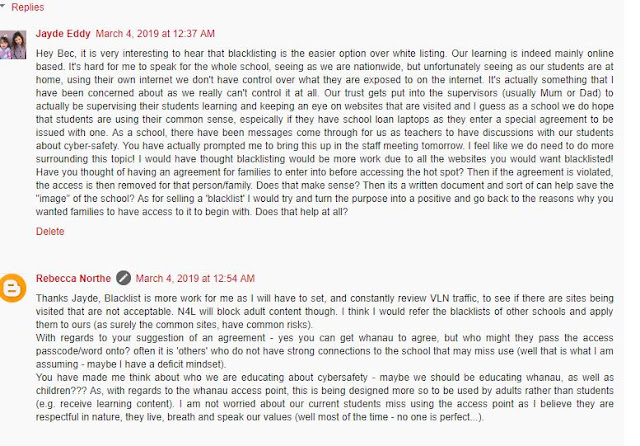Week 26 -Reflect on Your Inquiry (Take Action)
To what extent does gamification impact on behavioural engagement for distance learners?
This week I am using Rolfe's Reflective model (n.d) to review and reflect on the process so far.
What?
During the Take Action phase of my Inquiry, the most notable event has been that I have started to give out Dojo Points! The Dojo Points are carefully thought out and consist of the behaviours that I desire the most. These behaviours have been allocated the most points in the hopes that the students will keep repeating them:
By the end of this week, I had given out a total of 40 Dojo points to five different students, which was super exciting! The points that I have given out have been for contacting me, completing a module on My Te Kura and asking questions. This is a really positive start for my Inquiry as the lack of contact with my distance students I have found very frustrating and has lead to even more disengagement. The majority of the students on my class list are ones that have come from having negative educational experiences and it has lead them to be cognitively, behaviourally and emotionally disengaged with their learning. It is early on in the Inquiry, but I feel like this application is going to make all the difference for even the most disengaged student that I have!
So what?
As using ClassDojo is new to me and also my students, I believe that they are quite excited to be using this application alongside their learning. The gamification aspects of allocating points in ClassDojo I believe has been successful so far as the students that have received points continued to keep engaging that same day to collect more points. Another positive that comes from having the student's supervisors connected with the app on their phones, (Mum, Dad or Nan etc) is that they get notified when their student is allocated points, so it keeps them aware of how engaged their student is. I have found this connection to them absolutely great, as the parents have been messaging me directly through the app, so happy that their student is engaging! I have even had some parents ask if their second parent (Mum or Dad) or even if their social worker could be connected to their students Dojo account to keep them informed. This relates to the effective practice of whanaungatanga. Whanaungatanga is 'the process of establishing links, making connections and relating to the people' (n.d.)* This link to the student's supervisors and their wider whānaus is critical for not only my distance students success but also for my Maori students. Many studies have shown that 'whanaungatanga increases...even the lowest levels of engagement' (Bishop, Ladwig & Berryman, 2014, p. 28).
Now what?
I have learned that my students have enjoyed getting points but also that their supervisors have loved to see it happen even preferring to contact me through the Dojo app. Looking ahead for the rest of my Inquiry I hope to continue increasing the amount of Dojo points being allocated but it also would be great to have all 11 of my students being allocated points for being engaged. Moving forward, the only thing that I will do differently is setting aside a certain time each week where I personally acknowledge who has been collecting points so that they know I have been watching. I want to continue a high level of contact with my students, so that they know I am there, to help and support them, whenever they may need it. Next week I am hoping to do a few virtual chats with my students, which is the closest I can get to a face to face setting with a small portion of students that are geographically isolated.
References:
Bishop, R., Ladwig, J., & Berryman, M. (2014). The centrality of relationships for pedagogy: the whanaungatanga thesis. American Education Research Journal, 51, (1), 184-214.
Effective practices to promote and respond to wellbeing. (n.d.)*. Retrieved from https://www.ero.govt.nz/publications/wellbeing-for-success-a-resource-for-schools/effective-practices-to-promote-and-respond-to-wellbeing/
Otago Polytechnic. (n.d.). Reflective Writing. Retrieved from https://www.op.ac.nz/assets/LearningAdvice/Reflective-writing.pdf





Class Dojo is awesome. As you so rightly pointed out Jayde, students love seeing themselves get positive points as do their parents. Their parents can then reinforce this message at home. Students in my class compare themselves against others to see who has the most points etc and this competition aspect can really work well for creating the desired behaviour. When this behaviour has been mastered the points are then reduced and the new targeted behaviour has the most points allocated to it.
ReplyDeleteHi Shane. Yes and the reinforcement back in the home setting is unfortunately a lot of what makes my battle even harder, however, so far so good! I had wondered about the comparison also having a negative effect on their motivation, did you come across that at all? So far I haven't, it's been nothing but positive but just wondered if it will happen. Thank you so much for your feedback.
Delete